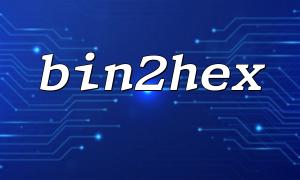In PHP, the bin2hex function is used to convert binary data into its hexadecimal representation. While the function looks simple, many developers wonder whether its return value is affected by character encoding. This article explores the question in depth and helps developers understand how to use the function correctly, along with the important points to watch out for.
bin2hex is a built-in PHP function that converts a binary string (for example, data read from a file or a binary stream) into a hexadecimal string. Its basic syntax is as follows:
<span><span><span class="hljs-keyword">string</span></span><span> </span><span><span class="hljs-title function_ invoke__">bin2hex</span></span><span> ( </span><span><span class="hljs-keyword">string</span></span><span> </span><span><span class="hljs-variable">$str</span></span><span> )
</span></span>Parameter:
$str: The input binary data, usually a string.
Return value:
A string representing the hexadecimal form. Each byte (8 bits) is represented by two hexadecimal characters.
For example:
<span><span><span class="hljs-variable">$data</span></span><span> = </span><span><span class="hljs-string">"hello"</span></span><span>;
</span><span><span class="hljs-keyword">echo</span></span><span> </span><span><span class="hljs-title function_ invoke__">bin2hex</span></span><span>(</span><span><span class="hljs-variable">$data</span></span><span>);
</span></span>Output:
<span><span>68656c6c6f
</span></span>The answer is: No.
The bin2hex function is not directly affected by character encoding. It operates on the raw bytes of the input string, not on decoded characters. Therefore, bin2hex only cares about the byte data of the input string, not its character encoding format.
Character Encoding vs. Bytes: Character encodings like UTF-8, GBK, or ISO-8859-1 determine how characters are mapped to bytes. The same character may have different byte representations depending on the encoding. For example, "A" has the same byte representation in ASCII and UTF-8, but "汉" will have very different representations in UTF-8 and GBK.
bin2hex Works on Bytes: When you pass data to bin2hex, it treats it as a raw byte sequence. It does not care about the encoding, it simply converts each byte into hexadecimal.
The Effect of Encoding: If you pass an already encoded string to bin2hex, the output will differ depending on the encoding because the byte sequences differ. That’s why the result changes when the input encoding is inconsistent.
For example, "A" in ASCII is 0x41, and in UTF-8 it is also 0x41. But the character "汉" in UTF-8 might be 0xE6 0xB1 0x89, while in GBK it might be 0xD6 0xD0. Without consistent encoding, the bin2hex output will vary.
Even though bin2hex itself is unaffected by encoding, encoding still matters in practice. Developers should pay attention to the following points when using it:
Ensure Consistent Input Encoding: Before passing strings to bin2hex, make sure they share the same encoding. Different encodings will result in different hexadecimal outputs. UTF-8 is the most common standard and should be preferred.
Understand the Data Source Encoding: If handling strings from external sources (databases, APIs, files, etc.), make sure you know their encoding. If necessary, convert them with mb_convert_encoding() or iconv() before passing them to bin2hex.
Binary Data vs. Text Data: bin2hex is mainly for binary data. If passing text data, be clear about how it is encoded into bytes. To avoid issues, it’s best to standardize on UTF-8 encoding.
Encoding with Multibyte Characters: When dealing with multibyte characters (like Chinese or Japanese), make sure the string encoding is correct. Otherwise, the hexadecimal output from bin2hex may not properly map back to the original text.
Here’s an example showing how to use bin2hex while ensuring encoding consistency:
<span><span><span class="hljs-comment">// Suppose we get data from a file or external API</span></span><span>
</span><span><span class="hljs-variable">$data</span></span><span> = </span><span><span class="hljs-string">"你好,世界"</span></span><span>;
<p></span>// Ensure the data is UTF-8 encoded<br>
$data = mb_convert_encoding($data, 'UTF-8', 'auto');</p>
<p>// Convert binary data to hexadecimal<br>
$hexData = bin2hex($data);</p>
<p>// Output result<br>
echo $hexData<br>
</span>In this example, the mb_convert_encoding() function ensures that $data is in UTF-8 encoding before being passed to bin2hex, which then converts it into a hexadecimal string.
The bin2hex function itself is not affected by character encoding since it only operates on bytes.
Character encoding affects the input data. Inconsistent encoding can lead to different hexadecimal outputs.
To ensure consistency, it is recommended to standardize on a single character encoding (such as UTF-8) when working with text data.
Understanding how bin2hex works and how it relates to character encoding can help developers avoid common pitfalls, ensuring stability and correctness in their applications.









